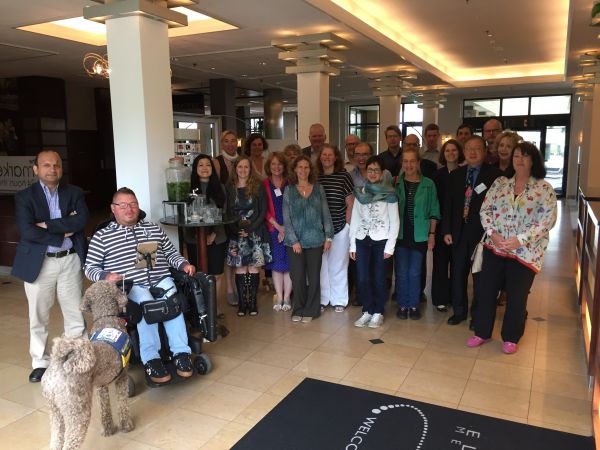Bone Protective Therapy in Duchenne MD
- Number 236
- Date 1 June 2018
Location: Hoofddorp, The Netherlands
Title: The 236th ENMC International Workshop on: "Bone protective therapy in DMD"
Date: 1-3 June 2018
Organisers: Dr R. Quinlivan (United Kingdom), Prof. V. Straub (United Kingdom), Prof. L. Ward (Canada), Dr J. Wong (United Kingdom)
Translations of this report:
Dutch translation by Dr E. Niks
Italian translation by Dr F. Broggi
Arabic translation by Dr. F. Aljuraibah
Greek translation by A. Kyriakou
Participants: Dr J. Adachi (Canada), Prof. F. Ahmed (United Kingdom), Dr M. Anderton (United Kingdom), Dr F. Broggi (Italy), Dr N. Crabtree (United Kingdom), Ms. P. Furlong (U.S.A.), Dr I. de Groot (The Netherlands), Dr M. Guglieri (United Kingdom), Mr. F. van Ieperen (The Netherlands), Dr S. Joseph (United Kingdom), Dr R. Keen (United Kingdom), Prof. A. Klein (Switzerland), Mr. J. Kuijer (The Netherlands), Prof. Z. Mughal (United Kingdom), Dr E. Niks (The Netherlands), Dr S. Novotny (U.S.A.), Dr R. Quinlivan (United Kingdom), Dr S. Roberts (United Kingdom), Prof. L. Sävendahl (Sweden), Prof. U. Schara (Germany), Prof. V. Straub (United Kingdom), Mrs. A. Stringer (United Kingdom), Drs E. Vroom (The Netherlands), Dr L. Ward (Canada), Dr D. Weber (U.S.A.), Dr J. Wong (United Kingdom) and Dr M. Zacharin (Australia)
Muscle and bone strength are closely related, the ‘mechanostat theory’ describes how muscle strength, which normally increases throughout childhood, promotes bone development. In Duchenne muscular dystrophy (DMD) muscle weakness, corticosteroid treatment and delayed puberty lead to an increased risk of bone fractures (limb and vertebral). Fractures have serious consequences including pain, loss of ambulation and fat embolus syndrome. Bone health, to assess risk of fractures can be assessed by different imaging methods.
Bone protective therapy involves prevention of fractures, detection of vertebral fractures, which can be asymptomatic, treatment of fractures to reduce pain and enable ‘reshaping’ of fractured vertebrae during childhood. Most boys with DMD have delayed puberty management of this is important for bone health. It was felt that oral bisphosphonates, a class of drugs that prevent the loss of bone density, are not as effective as intravenously administered bisphosphonates, furthermore compliance with oral treatment is poor. Intravenous bisphosphonates reduce pain and promote vertebral fracture healing but there is a risk of important side effects, usually with first dose. Newer bone drugs are increasingly available and could be studied in DMD.
Clinician and patient education on bone health is essential to advance the field of bone health in DMD. Combining data that may already exist could help to answer questions about bone health. A small placebo controlled trial for prevention of first fractures is necessary together with trials comparing bisphosphonates with new treatments to treat fractures ultimately optimize care of patients with DMD. Future steps include dissemination of knowledge across all stakeholders, establishing a working group and exploring funding possibilities.

A full report is published in Neuromuscular Disorders (pdf).
ENMC
Lt. generaal van Heutszlaan 6
3743 JN BAARN
The Netherlands
+ 31- 35-5480481
enmc@enmc.org
We may request cookies to be set on your device. We use cookies to let us know when you visit our websites, how you interact with us, to enrich your user experience, and to customize your relationship with our website.
Click on the different category headings to find out more. You can also change some of your preferences. Note that blocking some types of cookies may impact your experience on our websites and the services we are able to offer.
These cookies are strictly necessary to provide you with services available through our website and to use some of its features.
Because these cookies are strictly necessary to deliver the website, refusing them will have impact how our site functions. You always can block or delete cookies by changing your browser settings and force blocking all cookies on this website. But this will always prompt you to accept/refuse cookies when revisiting our site.
We fully respect if you want to refuse cookies but to avoid asking you again and again kindly allow us to store a cookie for that. You are free to opt out any time or opt in for other cookies to get a better experience. If you refuse cookies we will remove all set cookies in our domain.
We provide you with a list of stored cookies on your computer in our domain so you can check what we stored. Due to security reasons we are not able to show or modify cookies from other domains. You can check these in your browser security settings.
These cookies collect information that is used either in aggregate form to help us understand how our website is being used or how effective our marketing campaigns are, or to help us customize our website and application for you in order to enhance your experience.
If you do not want that we track your visit to our site you can disable tracking in your browser here:
We also use different external services like Google Webfonts, Google Maps, and external Video providers. Since these providers may collect personal data like your IP address we allow you to block them here. Please be aware that this might heavily reduce the functionality and appearance of our site. Changes will take effect once you reload the page.
Google Webfont Settings:
Google Map Settings:
Google reCaptcha Settings:
Vimeo and Youtube video embeds:
The following cookies are also needed - You can choose if you want to allow them:
You can read about our cookies and privacy settings in detail on our Privacy Policy Page.
Privacy Policy